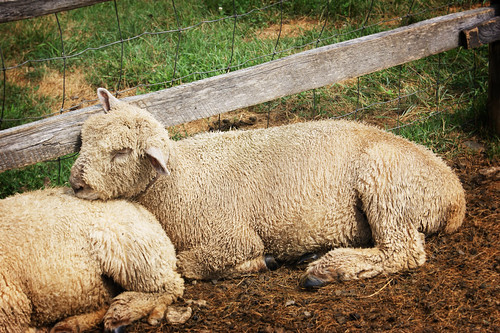The following is a reflection on John 10-11-18, the Gospel lesson for the Easter 4B, according to the Revised Common Lectionary.
When talking about John 10, verses 11 through 18, it’s hard not to also talk about the first ten verses of the chapter—because for Jesus it’s one teaching with related metaphors.
In 10:1-18, Jesus talks about a gate, a shepherd, a gatekeeper, a group of sheep, and a group of thieves and bandits. And that’s all well and fine, but Jesus explicitly claims to be the gate. I am the gate.
Then he explicitly claims to be the shepherd. I am the Good Shepherd.
And, depending on how you look at it, he might even be the gatekeeper at the same time. The gatekeeper opens the gate for him.
Whoa…hold on a minute.
So, Jesus-the-shepherd enters Jesus-the-gate because Jesus-maybe-the-gatekeeper opens it for him…so that he can get to the sheep.
Ok, Jesus is either having an identity crisis, he’s mixing his metaphors…or he’s trying to make some larger points. Which is what I actually think he’s doing.
First, there’s a weird little detail that is easily missed, and I think brings the whole thing into focus. In the thirteenth chapter of the Gospel of Luke, Jesus tells his disciples to “strive to enter through the narrow door, for many I tell you will seek to enter and will not be able.”
Unlike the gate-teaching in the Gospel of John that is often lost, this teaching from the Gospel of Luke is much better known.
And there’s the problem. If one isn’t careful, you’d read “I am the gate” in John and think it’s Jesus talking about the same thing as in Luke.
It isn’t.
The teaching from Luke is known because of its moralistic tone. Walk the “straight and narrow,” and therefore strive to make it into God’s Kingdom.
That may be what Jesus was saying in Luke. But, that certainly isn’t what Jesus is saying in the Gospel of John. This is a completely different teaching.
Because the sheep aren’t the ones entering the door—Jesus is going in the door.
The gatekeeper opens the gate for him, and the sheep hear his voice. He calls his own sheep by name and leads them out.
And Jesus leads the sheep out. Not in.
Not into the enclosure—not into the pen—not into the fenced in area.
Jesus enters and leads them—us—out.
Which, of course, begs the question: if Jesus is leading us out, where is he leading us out from?
And, maybe more importantly, where is he leading us to?
This little allegory that Jesus gives in the opening verses of the tenth chapter of John is actually an account of the meaning of the Incarnation: Jesus enters the world to lead us out.
But, second, Jesus the Good Shepherd is saving us from danger and evil. This section of John is intimately related to John 3:16—in fact the same Greek word is used in both passages: perish.
For God so loved the world that he sent his only begotten son, so that all who believe in him would not perish, but have eternal life.
The theif comes only to steal and kill and destroy.
God sent his Son, not just to bring us somewhere safe and wonderful, but to rescue us from danger and darkness. And, saving us from darkness wasn’t easy. The Good Shepherd laid down his life to do it.
This section of John fuses together the divine forces behind the Incarnation and the Sacrifice of the Cross.
For in this teaching Jesus tells us that he’s the Gate, and the Shepherd, and probably even the gatekeeper—so that we the sheep, might be kept away from the thieves and bandits.
 Portions of this post are direct quotes from my book, Going to Hell, Getting Saved, and What Jesus Actually Says. It’s available at Amazon, Barnes and Noble, the iBookstore, etc.
Portions of this post are direct quotes from my book, Going to Hell, Getting Saved, and What Jesus Actually Says. It’s available at Amazon, Barnes and Noble, the iBookstore, etc.


Pingback: Fruitful Branches, Fruitful Lives | Pastor, Preacher, Pray-er